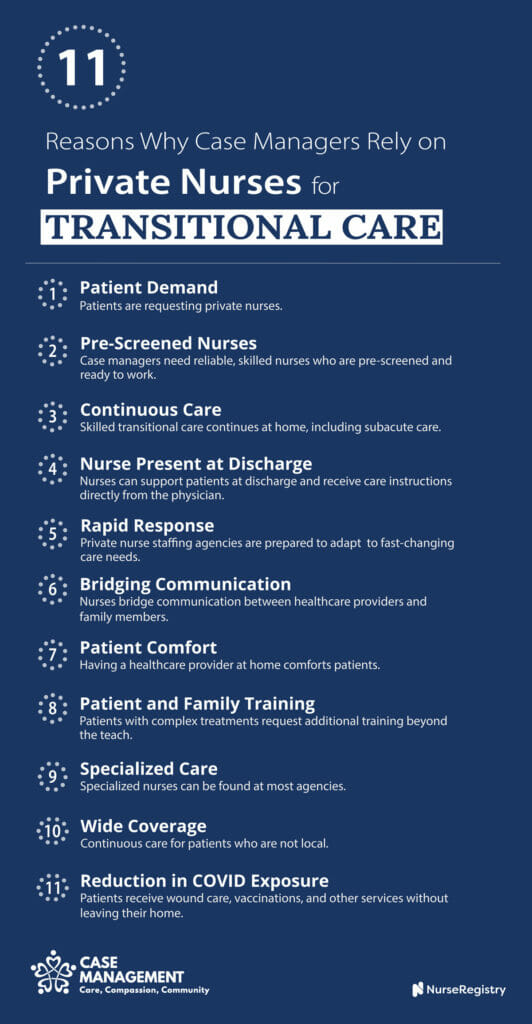More and more case managers are calling on private nurses to support patients at home while waiting for HHA services.
Private duty nursing agencies are changing transitional care with on-demand skilled nurses in patients’ homes providing continuous hospital level care.
It used to be that case managers worried about discharging patients who were ready to leave the hospital setting but not quite ready to fully care for themselves. There weren’t many options between skilled nursing facilities and home health for patients who require subacute care.
| In This Article |
|---|
| How Do Private Nursing Agencies Fit With HHAs and SNFs? |
| 11 Reasons Case Managers Turn to Private Nurses |
| Expert Opinions |
How Do Private Nursing Agencies Fit With HHAs and SNFs?
IN THIS ARTICLE

Skilled Nursing Facilities (SNF) provide total care for complex cases with an 80 mile/hour solution.
Nursing agencies provide excellent nursing and caregiver coverage through insurance, for which the paperwork can delay service to a 20 mile/hour crawl.
So what do case managers do for patients who are getting discharged to their homes—not a SNF—and may not have a nurse the first 24-48 hours through their HHA?
Expert case managers call a private duty nursing registry to provide a nurse in the hospital at discharge to receive all instructions, go home with the patient, care for the patient, and teach the patient and families how to manage their new treatment.
Private duty nurse agencies come in at 55 miles an hour, providing immediate skilled care at home.
Private nurses play a crucial role in case management, providing expert care to patients in the comfort of their own homes. Here are some reasons why case managers rely on private nurses:
- Patient demand: Patients are increasingly requesting private nurses to receive the expert care they need at home. While most patients pay out-of-pocket, some are finding ways to fund private nursing through their insurance. This demand for private nurses is driven by patients’ desire to receive personalized care, avoid hospital stays, and maintain their independence.
- Specialized care: Private nurses provide specialized care tailored to each patient’s unique needs. They work closely with nurse case managers to develop individualized care plans, monitor patients’ health, and adjust their care as needed. Private nurses can also provide education and support to patients and their families, helping them manage their conditions and improve their health outcomes.
- Cost-effective care: Private nursing can be a cost-effective option for patients who would otherwise require hospitalization or frequent visits to healthcare providers. Private nurses can help prevent hospital readmissions, reduce healthcare costs, and improve patients’ quality of life.
- Improved patient satisfaction: Private nursing can improve patients’ satisfaction with their care, as they receive personalized attention and support in the comfort of their own homes. This can lead to better patient outcomes, such as improved healing times and reduced stress. This can be especially useful for seniors who need private care.
Essentially, private nurses are a valuable asset to case management, providing specialized care, cost-effective solutions, and improved patient satisfaction. Nurse case managers can work closely with private nurses to develop comprehensive care plans that meet each patient’s unique needs and improve their overall health and well-being.

11 Reasons Case Managers Turn to Private Nurses
1. Patient Demand
Patients are getting more savvy and are requesting private nurses. While most patients pay out-of-pocket, some patients are finding ways to fund private nursing through their insurance and get the expert care they want at home.
2. Pre-Screened Nurses
Case managers don’t have time for interviews, background checks, and certification checks. They need reliable, skilled nurses who have been screened and are ready to work immediately. Each nursing agency performs different levels of screening, but background and reference checks are generally standard.
3. Continuous Care
Research has repeatedly shown that patient recovery and low readmission rates depend almost entirely on continuity of care post-discharge. Though private nursing agencies do not normally track remission rates, having a skilled nurse, whether 24/7 or for short wellness checks, ensures that the same level of care the patient receives in the hospital will continue at home.
4. Nurse Visit to the Hospital
Perhaps the biggest secret in private nursing, and the one that case managers attribute high success rates to, is the private nurse being at the hospital for discharge. There, the private nurse receives complete instructions in person from the case manager, physicians, and care team. Note: During the COVID-19 pandemic, hospital visitation policies vary and may include restricted entrance.
5. Specialized Care
Not all patients require the same skilled nursing care. Large nursing agencies have a wide variety of nurses on their registry, including oncology nurses, psych nurses, and various advanced practice nurses. All agencies enlist per diem nurses who have a wide variety of experience.
6. Rapid Response to Changes
Patient’s conditions change and their healthcare team needs to respond quickly. Whether a condition becomes more complex and requires 24/7 care or heals faster than expected and no longer needs any nursing care, private nurse staffing agencies are prepared to adapt to fast-changing care needs.
7. Bridging Communication
Oftentimes when a patient goes home, all communication drops. Private nurses assess the patient, monitor symptoms, and provide nursing notes to the case manager, physician, surgical team, or family. This way, everyone stays in the loop.
This communication goes both ways. A little-known secret is that private nurses can accompany their patients on hospital visits, helping to answer questions and receive instructions.
With difficult news, patients sometimes find it hard to process everything or may become unclear on all the instructions but are too overwhelmed or embarrassed to ask questions. When they return home, family and loved ones feel in the dark. Private nurses help bridge the two worlds so that patients are surrounded by a supportive and fully informed team of healthcare providers and family members.
8. Patient Comfort
As patients return home from medical emergencies or hospital stays, patients most commonly report feeling anxious—fearing the switch from full-service healthcare in a hospital setting to being responsible alone at home. Having a healthcare provider with them or checking in on them provides them with relief and reassurance that they’re on the right track.
9. Patient and Family Training
Every patient leaves a hospital with training and an in-home teacher. For most patients the teachers are sufficient. Occasionally, patients with complex treatments—infusions, tube feedings, dress stroma, or suctioning—request additional training.
Nurses come to their homes over the course of the first weeks to provide extra training until the whole family is comfortable doing everything on their own. The family and patient alike feel empowered and better equipped to deal with different scenarios.
10. Wide Coverage
Occasionally a case manager will discharge a patient that is not local. They need to make sure that the patient will be cared for, and that medical orders will be followed, wherever they are.
11. Reduction in Hospital Traffic and COVID Exposure
A private nurse can go to a patient’s home to provide services (like blood draws, assessments, and live physician updating) at home. Even vaccinations can be done at home, avoiding exposures to hospitals and other settings. Nurses can step up to provide late night medisets, emergency wound care, all sorts of things that private nurses can do to help lower COVID risks.
Collaboration Between Case Managers and Private Nurses
Case managers and private nurses work together to provide the best possible care for their patients. Collaboration between these two entities is essential in ensuring that patients receive the care they need, when they need it. Effective communication is key to this collaboration, as it allows case managers and private nurses to share information and coordinate care.
Private nurses are often hired by patients or their families to provide specialized care in the home setting. They work closely with case managers to ensure that the patient’s care plan is followed and that any changes in the patient’s condition are communicated to the case manager. Private nurses can provide valuable information to case managers, such as patient progress, medication changes, and any concerns the patient or family may have.
Case managers can also provide valuable information to private nurses, such as the patient’s medical history, current medications, and any other relevant information. This information can help private nurses provide the best possible care for their patients.
Collaboration between case managers and private nurses is essential in ensuring that patients receive the best possible care. Effective communication is key to this collaboration, as it allows case managers and private nurses to share information and coordinate care. By working together, case managers and private nurses can provide the best possible care for their patients and ensure that they receive the care they need when they need it.
The Impact of Private Nurses on Patient Care
Private nurses play a significant role in improving patient care by providing expert care in the comfort of a patient’s home. Here are some ways private nurses impact patient care:
- Personalized Care: Private nurses provide personalized care to patients, which is tailored to their unique needs. They work closely with patients and their families to develop care plans that meet their specific needs.
- Improved Patient Outcomes: Private nurses are highly skilled professionals who have a deep understanding of the complex healthcare system. They are trained to identify potential problems before they become serious and take proactive measures to prevent them. This helps improve patient outcomes and reduces the risk of hospital readmissions.
- Increased Patient Satisfaction: Patients who receive care from private nurses often report higher levels of satisfaction with their care. This is because private nurses provide one-on-one attention and care, which is not always possible in a hospital setting.
- Enhanced Communication: Private nurses act as a liaison between patients, their families, and healthcare providers. They ensure that everyone is on the same page and that there is clear communication about the patient’s care plan.
- Reduced Healthcare Costs: Private nurses can help reduce healthcare costs by preventing hospital readmissions and unnecessary emergency room visits. They also help patients avoid the high costs associated with long hospital stays.
Overall, private nurses play a crucial role in improving patient care by providing personalized care, improving patient outcomes, increasing patient satisfaction, enhancing communication, and reducing healthcare costs.
Expert Opinions
We’ve been in the business of supporting care managers and patients for over ten years. So, we’ve heard the accolades for private nursing services from the best care managers and physicians over the years.
“Finding skilled, professional nurses who are comfortable working outside of the hospital or clinic setting is challenging. When clients choose to return to their homes following an acute hospitalization or have a complex medical problem and require professional nursing services, NurseRegistry has never failed to find well-qualified staff for our clients. NurseRegistry is highly professional, has extensive experience, and is very easy to work with. They understand complex medical care needs and are dedicated to excellence. The Life Care Company manages numerous families with complex medical needs and highly recommends NurseRegistry for professional nursing services at home.”
Kathy Berra, MSN, NP-BC, FAHA, FAAN | TLC Care Manager
They understand complex medical care needs and are dedicated to excellence.” Kathy Berra, TLC Care Manager
“Very timely help and excellent nurses have been provided to us. They are a great organization.”
Nancy Miller, BSN | TLC Care Manager
“NurseRegistry services are one of the best and most trusted nursing services on the Peninsula. Our medical practice is a concierge service in Menlo Park and we have a number of patients that require high touch-point nursing care on demand at their house. NurseRegistry is our top go-to service that we refer our patients to. They are absolutely trustworthy—if they say that they are going to send a nurse, a nurse is sent.
The NurseRegistry team does their very best to find the best possible match between the needs of the patient and their nursing team. We’ve gotten high praise about how much NR will accommodate to make patients happy. Their team is always on time. Their nurses are extremely well trained in a number of areas including complicated rare treatments that some of our patients need. NR nurses truly care for patients—they love their jobs and have a true calling—which matters so much when it comes down to providing the most personalized care. Thank you NurseRegistry for all the hard work you do every single day.”
Dr. Ian Kroes | Peninsula Doctor
We’ve gotten high praises about how much NR will accommodate to make patients happy.” –Dr. Ian Kroes, Peninsula Doctor
“As a geriatrician in the community, it has been a great pleasure to work with NurseRegistry. I really admire their professionalism and their caring approaches, especially for my vulnerable patients’ population.
I am also impressed by their eagerness to learn and improve themselves through better education regarding patient care. Overall I see great potential for this company in the future as our aging population is growing significantly. Keep up the good work!”
Mehrdad Ayati, MD
I am also impressed by their eagerness to learn and improve themselves through better education regarding patient care.” Mehrdad Ayati, MD
If the top physicians and case managers say that skilled nurse visits to the home keep patients healthy and happy, who are we to argue?
Conclusion
So, to sum up the reasons why case managers keep private nursing agencies in their proverbial Rolodex, it’s because private nurses are ready to go, flexible, skilled, and they make patients feel safe and happy.
Learn more about NurseRegistry today.
Frequently Asked Questions
What is the role of a private nurse in case management?
A private nurse plays a crucial role in case management by providing personalized care to patients in the comfort of their homes. They work closely with the case manager to develop a care plan that meets the patient’s specific needs, which may include administering medication, monitoring vital signs, and providing wound care.
What do private nurses do?
Private nurses provide a range of services to patients, depending on their individual needs. They may perform tasks such as administering medication, providing wound care, monitoring vital signs, and assisting with activities of daily living. They also communicate with other healthcare professionals involved in the patient’s care to ensure that the patient receives comprehensive care. They do not offer physical therapy or chiropractic care.
What are the benefits of having private nurses in case management?
Private nurses provide several benefits to patients and case managers. Patients receive personalized care in the comfort of their homes, which can lead to improved outcomes and increased patient satisfaction. Case managers benefit from having a dedicated healthcare professional who can provide detailed information about the patient’s condition and progress.
How do private nurses differ from other nursing roles in case management?
Private nurses differ from other nursing roles in case management in that they provide one-on-one care to patients in their homes. Other nursing roles in case management may involve working in hospitals, clinics, or other healthcare settings.
What are the advantages of outpatient case management with private nurses?
Outpatient case management with private nurses provides several advantages, including improved patient outcomes, increased patient satisfaction, and reduced healthcare costs. Patients receive personalized care in the comfort of their homes, which can lead to better outcomes and fewer hospital readmissions.
What are the responsibilities of a nurse case manager?
Nurse case managers are responsible for coordinating care for patients with complex medical conditions. They work with patients, healthcare professionals, and insurance companies to develop a care plan that meets the patient’s specific needs. They also monitor the patient’s progress and adjust the care plan as needed.
Why is coordination important in case management and how do private nurses contribute?
Coordination is important in case management because it ensures that patients receive comprehensive care that meets their specific needs. Private nurses contribute to coordination by communicating with other healthcare professionals involved in the patient’s care, providing detailed information about the patient’s condition and progress, and ensuring that the patient receives personalized care.
What does a case manager do?
A case manager is responsible for coordinating care for patients with complex medical conditions. They work with patients, healthcare professionals, and insurance companies to develop a care plan that meets the patient’s specific needs. They also monitor the patient’s progress and adjust the care plan as needed.






